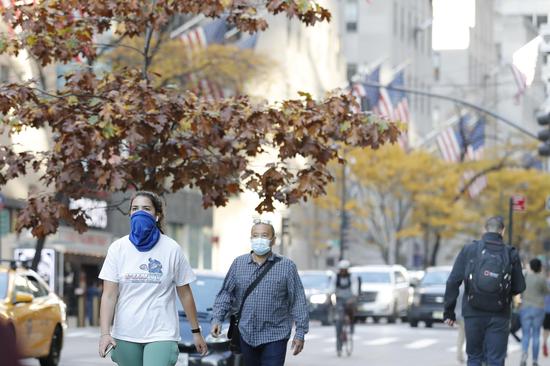
A view of the campus of Harvard University on July 14, 2020 in Cambridge, Massachusetts. The Trump administration rescinded a policy that would have barred foreign students from staying in the U.S. if they take online-only classes for the fall semester.(Photo/Xinhua)
A U.S. State Department official has said the country will continue to welcome students from China, as recent visa policies have affected that largest source of foreigners studying on American campuses amid a 43 percent international drop overall.
The number of Chinese international students in the U.S. saw its lowest growth rate in a decade — 0.8 percent — to reach 372,532 in the 2019-20 academic year. The total still makes China the top source of international students in the U.S., according to a report released Monday.
Students from China accounted for 34.6 percent of the slightly more than 1 million international students the U.S. hosted during the 2019-20 academic year, said the 2020 Open Doors Report on International Educational Exchange.
Prior to the impact of the COVID-19 pandemic, the total number of international students in U.S. higher education had declined by 1.8 percent, according to the report.
With the pandemic still raging in the U.S. eight months since its outbreak, the shrinkage in international students is likely to continue.
Already, the new enrollment of international students decreased by 43 percent in the fall 2020 semester, according to the 2020 Fall International Student Enrollment Snapshot Survey, released along with the Open Doors report.
Nearly all (99 percent) U.S. institutions taught classes online or used a hybrid teaching model during the fall 2020 semester, and 90 percent of institutions reported international student deferrals in fall 2020, noted the survey, conducted by the Institute of International Education (IIE) and nine partner higher education associations.
More than 700 higher education institutions surveyed indicate that nearly 40,000 students have deferred enrollment to a future term.
As relations between the world's top two economies soured in recent months, the U.S. administration has ramped up restrictions and scrutiny on some Chinese students and researchers, citing national security concerns.
For example, the U.S. had revoked the visas of more than 1,000 Chinese nationals ahead of the fall semester, under a May 29 presidential proclamation to suspend entry from China of some students and researchers deemed security risks, according to the U.S. State Department.
Asked if Chinese students will be treated "equally and fairly" in the U.S., a State Department official told China Daily, "We continue to welcome Chinese students for legitimate study across all fields."
Quoting U.S. President Donald Trump, Anthony Koliha, director of the Office of Global Educational Programs under the State Department, said the U.S. has "incredible talent coming in from China. They occupy a big space at the universities, and we want to keep it that way.
"I can absolutely confirm that U.S. higher education institutions, and the U.S. writ large, continue to welcome Chinese students into our campuses and into our communities," Koliha said at a Zoom meeting on Nov 12 ahead of the release of the Open Doors report.
He said the U.S. approach to identifying "problematic cases" affects only a small fraction of the Chinese students studying in the United States.
But China's Foreign Ministry has said the U.S. visa restrictions on Chinese students and researchers had severely undermined their legitimate rights and interests and run counter to the common aspiration for friendly people-to-people, especially youth-to-youth exchange.
A white paper released in June by New Oriental, China's leading education service provider, has suggested that 42 percent of Chinese students are interested in studying in the United Kingdom, compared with 37 percent in the U.S.. That was the first time that the overseas study intention for Chinese students shifted.
Over half of the more than 700 institutions participated in the Fall Snapshot Survey said they would commit to focusing on student recruitment and outreach in China, according to Mirka Martel, head of Research, Evaluation &Learning at IIE.
"So we certainly continue to see a focus on China for recruiting future international students as well," she said.
The 2020 Open Doors report also indicated U.S. students showing a strong interest in study-abroad programs prior to the pandemic, as during the 2018-19 academic year, 347,099 U.S. students studied abroad for academic credit, a 1.6 percent increase over the previous year.
China is the most popular destination in Asia for U.S. students, attracting 11,639 to its campuses, close to the number of U.S. students going to Germany or Ireland, according to the report.
While 52 percent of international students in the U.S. pursued majors in STEM (science, technology, engineering and mathematics) fields in 2019-20, the top three fields for American students outside the country are business and management, social sciences and physical and life sciences, according to the report.
International students contribute nearly $44 billion to the U.S. economy and support at least 450,000 American jobs, the Open Doors 2020 report said, citing U.S. Department of Commerce figures.


















































